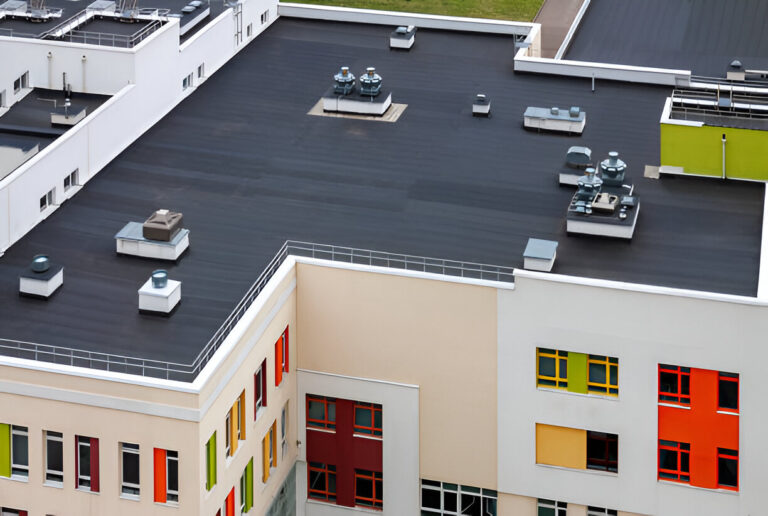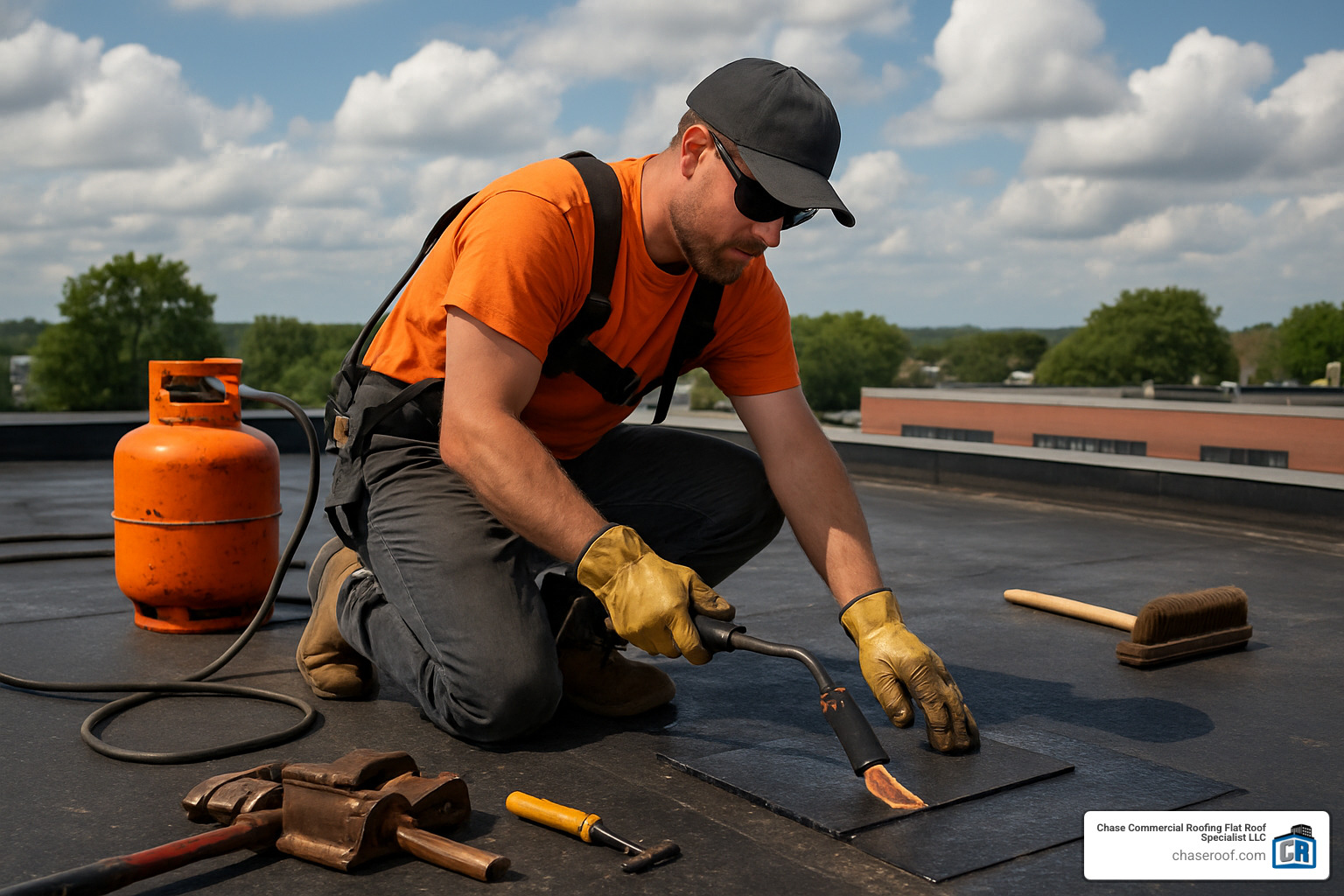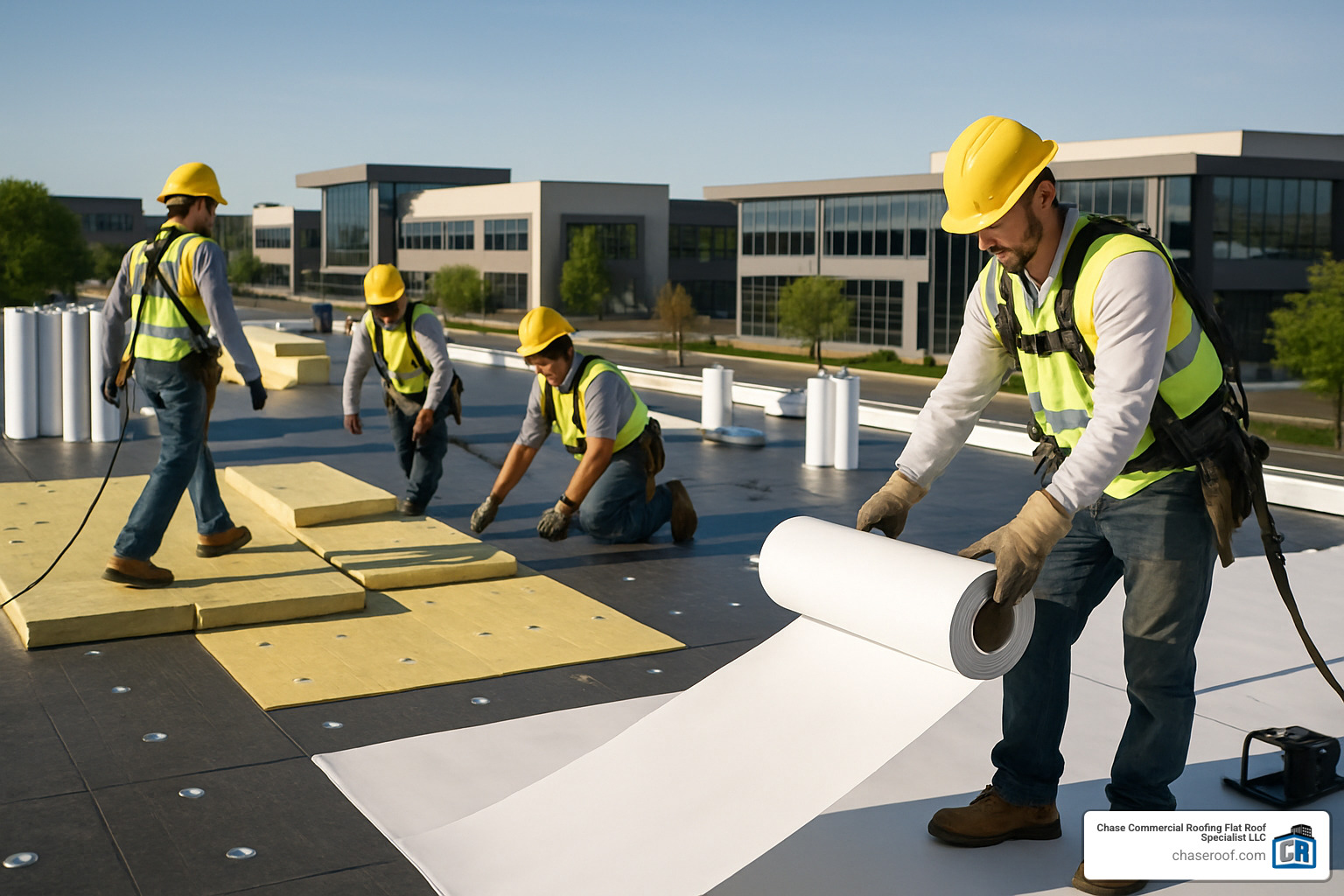When it comes to roofing, flat roofs offer several unique advantages, especially for commercial properties. They provide valuable space for HVAC systems, solar panels, or even rooftop gardens. However, flat roofs also present specific challenges, particularly with drainage and durability. So, what is the best roofing material for your flat roof?
Here at Chase Commercial Roofing Flat Roof Specialist LLC in Woodland Park, NJ, we’ve seen firsthand how choosing the right roofing material can significantly impact a property’s long-term performance. Let’s explore the best roofing types for flat roofs, their pros and cons, and what makes each option suitable for your specific needs.
Common Flat Roof Materials
Flat roofs are common in commercial and some residential buildings due to their practicality and ease of installation. Here are the top materials commonly used:
- TPO (Thermoplastic Polyolefin)
- EPDM (Ethylene Propylene Diene Monomer)
- Modified Bitumen
- PVC (Polyvinyl Chloride)
- Built-Up Roofing (BUR)
1. TPO Roofing
TPO roofing is rapidly gaining popularity due to its durability, energy efficiency, and cost-effectiveness. It’s a single-ply membrane made from synthetic materials and reinforced with fabric.
Pros:
- Excellent UV and heat resistance
- Highly reflective surface reduces cooling costs
- Environmentally friendly (recyclable)
- Long lifespan (20-30 years)
Cons:
- Quality depends significantly on the installation
- Potential seam failure if improperly welded
2. EPDM Roofing
Commonly known as rubber roofing, EPDM is a popular choice for commercial flat roofs because of its affordability and ease of installation.
Pros:
- Cost-effective installation
- Strong resistance to weathering and UV rays
- Low maintenance and durable (up to 25 years)
Cons:
- Can absorb heat, affecting energy efficiency
- Seams may become vulnerable over time
3. Modified Bitumen
Modified bitumen is an asphalt-based roofing system, typically applied in layers and heat-sealed, providing robust waterproofing.
Pros:
- Highly durable and puncture-resistant
- Excellent waterproofing capabilities
- Easier maintenance and repair
Cons:
- Shorter lifespan compared to TPO or EPDM
- Can be prone to cracking under extreme temperature fluctuations
4. PVC Roofing
PVC roofing membranes are known for their strength, chemical resistance, and flexibility, making them ideal for commercial facilities.
Pros:
- Exceptional durability and resistance to chemicals and fire
- Energy-efficient due to reflective surface
- Highly resistant to punctures and tears
Cons:
- Higher upfront costs
- Can shrink over time, potentially impacting seams
5. Built-Up Roofing (BUR)
Also known as “tar and gravel” roofs, BUR is one of the oldest methods for flat roofing, involving alternating layers of bitumen and reinforcing fabrics.
Pros:
- Excellent waterproofing and durability
- Superior fire resistance
- Proven reliability over many decades
Cons:
- Heavier material, possibly requiring additional structural support
- The installation process is labor-intensive and can be messy
Which Flat Roofing Material is Best for You?
Choosing the right material for your flat roof depends on several factors:
- Climate: Local weather conditions, like those experienced in Woodland Park, NJ, can significantly impact your roof’s lifespan.
- Budget: Evaluate initial installation costs versus long-term maintenance and repair expenses.
- Building Use: The specific needs of your property—whether commercial, industrial, or residential—play a critical role in choosing the right material.
Our Recommendation
For commercial properties in Woodland Park, NJ, TPO roofing is often the best choice. It offers a balance between durability, energy efficiency, ease of installation, and cost-effectiveness. Its reflective surface notably reduces cooling costs, making it ideal for New Jersey’s fluctuating weather.
Maintenance Tips to Extend Your Flat Roof’s Lifespan
No matter which roofing type you choose, proper maintenance is crucial. Follow these simple yet effective tips:
- Regular Inspections: Perform roof inspections at least twice annually, ideally during spring and fall, to identify issues early.
- Immediate Repairs: Address small leaks or damages immediately to prevent escalation.
- Proper Drainage: Ensure your roof’s drainage systems are clear of debris to avoid ponding water, which can severely damage your roof.
For comprehensive roofing maintenance guidelines, the National Roofing Contractors Association (NRCA) provides valuable insights and standards for roofing best practices.
Why Choose a Local Roofing Expert?
Partnering with local roofing specialists like Chase Commercial Roofing Flat Roof Specialist LLC offers significant advantages, including:
- Knowledge of local building codes and weather patterns
- Faster response times for emergency repairs
- Personalized service tailored specifically to your building’s needs
With deep roots in the Woodland Park community, our expertise is perfectly suited to address local roofing challenges.
Selecting the best roofing for your flat roof is critical to protecting your property and maximizing its efficiency and longevity. While each roofing type has advantages and disadvantages, understanding your unique needs ensures the best decision for your situation.
Chase Commercial Roofing Flat Roof Specialist LLC in Woodland Park, NJ, offers experienced guidance, professional installation, and reliable maintenance to ensure your flat roof remains robust and efficient for many years. Reach out today, and let’s discuss how we can protect your building with the ideal flat roofing solution.







